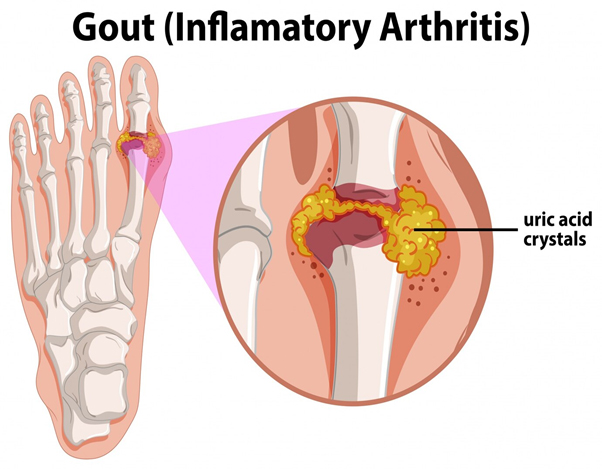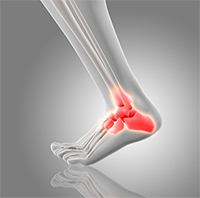Introduction
- Gout is a form of arthritis in an individual accompanied with symptoms like severe pain, stiffness, and swelling of one or more joints.
- The root cause of this condition mainly we can say is the disorder of purine metabolism.
- It's generally characterised by frequent attacks of swelling, redness, and a tender, warm,and puffy expression of bone joint areas.
Understanding Gout
Gout arises from a disorder in purine metabolism, resulting in elevated uric acid levels in the blood and subsequent crystallisation in the joints. Factors such as alcohol consumption, obesity, dehydration, and certain medications contribute to gout development.

Causes of Gout
Gout is a result of a disorder in purine metabolism. When there is an increase in the uric acid level in blood, there is a chance of crystallisation of uric acid. Such Crystals are deposited in joints which start showing the symptoms of gout.
The predominant reason for the increased level of blood urea is the reduced amount of excretion of uric acid from the body.
- Factors that influence rates of gout are
- Drinking alcohol
- Overweight
- Drinking soda
- Becoming dehydrated
- Due to weather
- Poorly fitting shoes
- Medical treatments

Symptoms of Gout
- Discoloration/ Redness
- Swelling
- Stiffness
- Tenderness - even to light touch
- Warmth aur feeling like joint is on fire

Diagnosis of Gout
- X- ray
- Ultrasound
- Magnetic resonance
- CT Scan
Other common tests to diagnose gout include:
- Blood tests to measure the uric acid in your blood.
- Joint aspiration- using a needle to remove a sample of fluid from inside a joint.
Risk factors of gout
- Overweight or obesity
- Congestive heart failure
- Diabetes
- Hypertension (high blood pressure)
- Kidney disease
- Blood cancer
You're more likely to experience gout if you:
- Have a biological parent or grandparent who has gout
- Eat a lot of animal proteins - especially animal flesh, shellfish and foods that contain organ meat.
- Drink alcohol regularly
- Take diuretic medication (water pills).
- Take immunosuppressants
Food which causes Gout
- Sugary drinks and sweets: Any food or drink with high sugar content can trigger gout.
- High fructose corn syrup: Packaged food products and processed snacks can contain lots of high fructose corn syrup.
- Alcohol
- Organ meats: These include liver, tripe, sweetbreads, brains and kidneys.
- Certain seafood
- Red meat: Beef, lamb, pork and bacon.
- Gravy and meat sauces.
Homoeopathy and Gout
Homoeopathic treatment for Gout is individualised, with remedies selected based on the specific symptoms and constitution of the person. A qualified homoeopathic practitioner will consider factors such as the type and location of pain, associated symptoms, and the person's overall health.
It's important to note that homoeopathic remedies should be used under the guidance of a trained homoeopath. In severe cases or if complications arise, conventional medical intervention may still be necessary.
Common Homoeopathic Remedies for Gout
- Colchicum
- It is mostly used in chronic cases of gout.
- Patients experience extreme pain in the big toe, which is too intense to be touched.
- The toe and other parts that get affected become swollen, red, and hot. The pain worsens in the evening and at night.
- Ledum Pal
- This effective homoeopathic medicine is used in cases where the pain travels in an upwards direction from below.
- The pain is likely to start at the feet and gradually move upwards, affecting the knees and legs.
- The pain also shoots through limbs. Small joints are commonly affected. The ankle balls or big toe may be swollen.
- Benzoic acid
- This homoeopathic medicine is used for treating gout where offensive urine is experienced.
- Extreme pain is experienced in the big toe and the knees are swollen.
- Antim Crudum
- This is an efficient homoeopathic medicine used for treating gout.
- It is used when a patient experiences gastric symptoms along with joint pain and inflammation.
- Sabina
- This homoeopathic medicine is important for treating gout in women when the patient already suffers from another female disorder.
- Shooting pain is experienced in the toes and heels.
Benefits of Homoeopathic Treatment
- Individualised Care: Homoeopathy recognizes that each person is unique. A homoeopath will assess your symptoms, medical history, and lifestyle to prescribe a personalised treatment plan tailored to your needs.
- Gentle and Natural: Homoeopathic remedies are derived from natural substances and are known for their minimal side effects. They work in harmony with the body, promoting self-healing and overall well-being.
- Holistic Approach: Homoeopathy takes into account not only the physical symptoms but also the emotional and mental aspects of an individual. It aims to restore balance at all levels, providing comprehensive care.
- Long-Term Relief: By addressing the underlying causes of Ulcerative Colitis,homoeopathy strives to achieve long-term relief and improved quality of life.
Patient Review
Consulting a Homeopath
Seeking guidance from a qualified homoeopathic practitioner is essential for tailored gout treatment. A trained Sanjivani homoeopath considers factors such as pain type, location, associated symptoms, and overall health to select appropriate remedies.
Sanjivani Homeopathy Clinic USP
- No homoeopathy Dietary Restrictions:
Allows patients to enjoy foods like onion, garlic, and coffee, ensuring a stress-free treatment journey.
- 24/7 Online Consultations:
Enables convenient access to doctors with detailed counseling, history management, and follow-ups.
- Highly Skilled Team:
Experienced BHMS and MD doctors, supported by multilingual and professional staff.
- Patient-Centric Care:
Simplifies treatment with modern, adaptable solutions and clear communication.
Click Here for Detailed "Sanjivani USP"
FAQ's
- What is homoeopathy ?
Homoeopathy is a holistic science which belives in the law of Similia Similibus Curenter i.e Like Cures Like .It was discovered by Dr Samuel Christian Hahnemannn in 1796.
- Is there any side effects of homoeopathy?
As homoeopathic medicines are made from natural substances this medicines have no side effects and are completely safe to consume
- Is there any diet restriction to take homoeopathic medicines?
There are no diet restrictions for homoeopathic medicines. One should only avoid eating or drinking any liquid other than water at least 30 minutes before and after taking homoeopathic medicines.
Click Here for "Frequently Asked Questions."
Conclusion
Homoeopathic management of Gout provides a natural and holistic approach to alleviate symptoms and address root causes. It is crucial to consult with a qualified healthcare professional to determine the most appropriate treatment. When used judiciously, homoeopathy can be a valuable addition for individuals seeking natural relief from the pain and discomfort associated with gout. Sanjivani Homoeopathy offers acute pain management without imposing diet restrictions, providing a potential alternative for those exploring natural solutions.
Disclaimer : The information provided in this blog is for educational purposes only and should not be considered medical advice. Please consult with a qualified healthcare professional before starting any treatment for Gout or any other medical condition.


